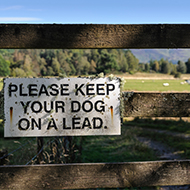Reported increase in dog attacks on livestock

"Recall is truly the one life-saving skill that everyone needs to teach their dogs" - Ryan Neile, Blue Cross head of behaviour.
UK animal welfare charity Blue Cross is asking dog owners to 'lead by example', and consider other animals when walking their dog, after an increase in the number of dog attacks on livestock.
As Blue Cross reports, last year saw an increase in the number of dog attacks on livestock, with one Monmouthshire farmer reporting a huge loss of 50 ewes and their unborn lambs.
Research conducted by the charity has discovered that even though 42 per cent of dog owners agree that dogs should be kept on a lead around livestock, only 25 per cent actually do so.
Blue Cross head of behaviour, Ryan Neile, said: “While beautiful companions and family friends in our homes, we must not ignore that dogs are predatory animals. Recall is truly the one life-saving skill that everyone needs to teach their dogs.
“It is vital for not only protecting your own dog from dangers, but also to protect other animal species.
“Blue Cross hopes to inspire people to have fun training recall with their dogs and also bust myths that life on a lead can’t be fulfilling and fun for both dog and owner.”
Of the dog owners surveyed, 19 per cent said that their dog has killed another animal, and a shocking 70 per cent said that they had witnessed someone else's dog out of control.
Chris Packham, nature photographer, television presenter and author, is a Blue Cross Education Ambassador. He commented: “When we share our lives with dogs, we not only have a responsibility to them but also to the other wonderful species that share our world.
“All year round, dogs who have not had the right training can pose a potential threat to wildlife and livestock. This is through no fault of their own but simply because of their genetic make-up and what their breeds may literally be designed to do!
“I support Blue Cross to bust myths that time spent on the lead is somehow denying your dog pleasure or enjoyment. We need to keep all our animal friends safe, and that includes the ones in our home and outside.”



 The latest
The latest